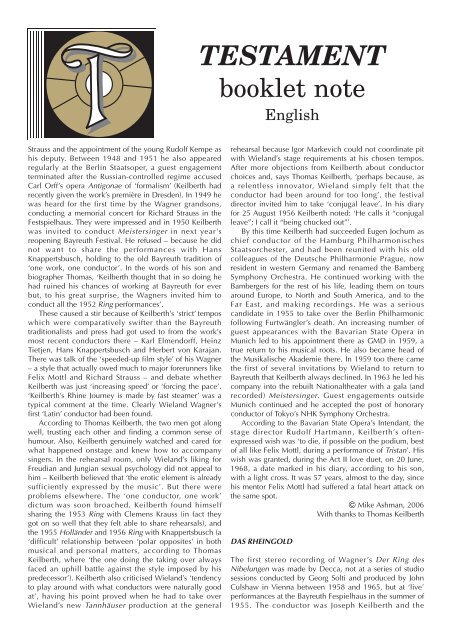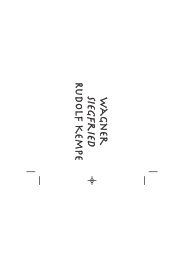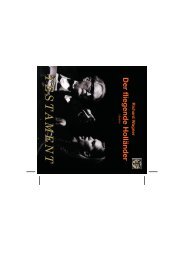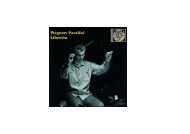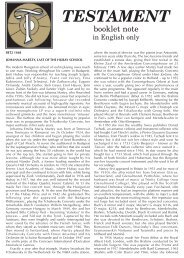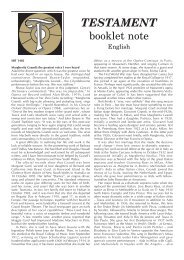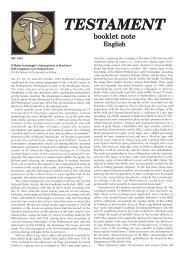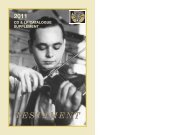Create successful ePaper yourself
Turn your PDF publications into a flip-book with our unique Google optimized e-Paper software.
Strauss and the appointment of the young Rudolf Kempe as<br />
his deputy. Between 1948 and 1951 he also appeared<br />
regularly at the Berlin Staatsoper, a guest engagement<br />
terminated after the Russian-controlled regime accused<br />
Carl Orff’s opera Antigonae of ‘formalism’ (Keilberth had<br />
recently given the work’s première in Dresden). In 1949 he<br />
was heard for the first time by the Wagner grandsons,<br />
conducting a memorial concert for Richard Strauss in the<br />
Festspielhaus. They were impressed and in 1950 Keilberth<br />
was invited to conduct Meistersinger in next year’s<br />
reopening Bayreuth Festival. He refused – because he did<br />
not want to share the performances with Hans<br />
Knappertsbusch, holding to the old Bayreuth tradition of<br />
‘one work, one conductor’. In the words of his son and<br />
biographer Thomas, ‘Keilberth thought that in so doing he<br />
had ruined his chances of working at Bayreuth for ever<br />
but, to his great surprise, the Wagners invited him to<br />
conduct all the 1952 Ring performances’.<br />
These caused a stir because of Keilberth’s ‘strict’ tempos<br />
which were comparatively swifter than the Bayreuth<br />
traditionalists and press had got used to from the work’s<br />
most recent conductors there – Karl Elmendorff, Heinz<br />
Tietjen, Hans Knappertsbusch and Herbert von Karajan.<br />
There was talk of the ‘speeded-up film style’ of his Wagner<br />
– a style that actually owed much to major forerunners like<br />
Felix Mottl and Richard Strauss – and debate whether<br />
Keilberth was just ‘increasing speed’ or ‘forcing the pace’.<br />
‘Keilberth’s Rhine Journey is made by fast steamer’ was a<br />
typical comment at the time. Clearly Wieland Wagner’s<br />
first ‘Latin’ conductor had been found.<br />
According to Thomas Keilberth, the two men got along<br />
well, trusting each other and finding a common sense of<br />
humour. Also, Keilberth genuinely watched and cared for<br />
what happened onstage and knew how to accompany<br />
singers. In the rehearsal room, only Wieland’s liking for<br />
Freudian and Jungian sexual psychology did not appeal to<br />
him – Keilberth believed that ‘the erotic element is already<br />
sufficiently expressed by the music’. But there were<br />
problems elsewhere. The ‘one conductor, one work’<br />
dictum was soon broached. Keilberth found himself<br />
sharing the 1953 Ring with Clemens Krauss (in fact they<br />
got on so well that they felt able to share rehearsals), and<br />
the 1955 Holländer and 1956 Ring with Knappertsbusch (a<br />
‘difficult’ relationship between ‘polar opposites’ in both<br />
musical and personal matters, according to Thomas<br />
Keilberth, where ‘the one doing the taking over always<br />
faced an uphill battle against the style imposed by his<br />
predecessor’). Keilberth also criticised Wieland’s ‘tendency<br />
to play around with what conductors were naturally good<br />
at’, having his point proved when he had to take over<br />
Wieland’s new Tannhäuser production at the general<br />
<strong>TESTAMENT</strong><br />
booklet note<br />
English<br />
rehearsal because Igor Markevich could not coordinate pit<br />
with Wieland’s stage requirements at his chosen tempos.<br />
After more objections from Keilberth about conductor<br />
choices and, says Thomas Keilberth, ‘perhaps because, as<br />
a relentless innovator, Wieland simply felt that the<br />
conductor had been around for too long’, the festival<br />
director invited him to take ‘conjugal leave’. In his diary<br />
for 25 August 1956 Keilberth noted: ‘He calls it “conjugal<br />
leave”; I call it “being chucked out”’.<br />
By this time Keilberth had succeeded Eugen Jochum as<br />
chief conductor of the Hamburg Philharmonisches<br />
Staatsorchester, and had been reunited with his old<br />
colleagues of the Deutsche Philharmonie Prague, now<br />
resident in western Germany and renamed the Bamberg<br />
Symphony Orchestra. He continued working with the<br />
Bambergers for the rest of his life, leading them on tours<br />
around Europe, to North and South America, and to the<br />
Far East, and making recordings. He was a serious<br />
candidate in 1955 to take over the Berlin Philharmonic<br />
following Furtwängler’s death. An increasing number of<br />
guest appearances with the Bavarian State Opera in<br />
Munich led to his appointment there as GMD in 1959, a<br />
true return to his musical roots. He also became head of<br />
the Musikalische Akademie there. In 1959 too there came<br />
the first of several invitations by Wieland to return to<br />
Bayreuth that Keilberth always declined. In 1963 he led his<br />
company into the rebuilt Nationaltheater with a gala (and<br />
recorded) Meistersinger. Guest engagements outside<br />
Munich continued and he accepted the post of honorary<br />
conductor of Tokyo’s NHK Symphony Orchestra.<br />
According to the Bavarian State Opera’s Intendant, the<br />
stage director Rudolf Hartmann, Keilberth’s oftenexpressed<br />
wish was ‘to die, if possible on the podium, best<br />
of all like Felix Mottl, during a performance of Tristan’. His<br />
wish was granted, during the Act II love duet, on 20 June,<br />
1968, a date marked in his diary, according to his son,<br />
with a light cross. It was 57 years, almost to the day, since<br />
his mentor Felix Mottl had suffered a fatal heart attack on<br />
the same spot.<br />
� Mike Ashman, 2006<br />
With thanks to Thomas Keilberth<br />
DAS RHEINGOLD<br />
The first stereo recording of Wagner’s Der Ring des<br />
Nibelungen was made by Decca, not at a series of studio<br />
sessions conducted by Georg Solti and produced by John<br />
Culshaw in Vienna between 1958 and 1965, but at ‘live’<br />
performances at the Bayreuth Fespielhaus in the summer of<br />
1955. The conductor was Joseph Keilberth and the


